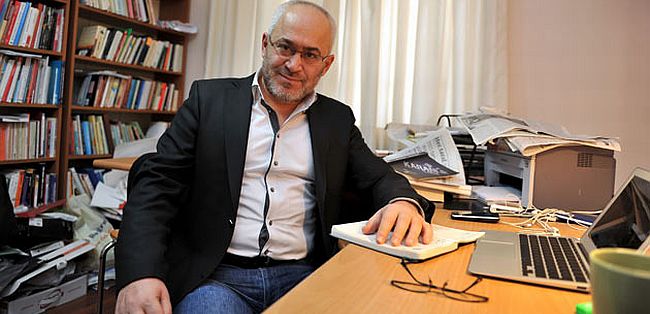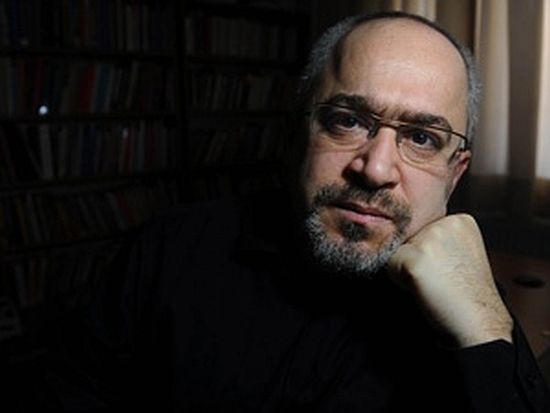Orhan Kemal Cengiz: 'Gayrimüslimler ve eski paradigma'


Orhan Kemal Cengiz, Today's Zaman'da yayımlanan yazısında, Agos Gazetesi Genel Yayın Yönetmeni Rober Koptaş'ın 'AK Parti, gayrimüslimler ve eski paradigma' başlıklı makalesine eğiliyor.
AK Parti'nin demokratikleşme yönündeki adımlarının önüne geçen devlet içi 'aktörler' olduğu yönündeki kanının aksine, AK Parti'nin artık tüm demokratik ülkelerde olması gerektiği gibi devletin tüm aktörleri üzerinde kontrolü olduğunu savunan Cengiz, dolayısıyla bu argümanın artık geçerli olmadığını belirtiyor.
Bununla beraber yazar, hükümeti demokratikleşme, bilhassa da azınlık hakları noktasında adım atmaktan alıkoyan gerekçeleri irdelediği yazısı üzerine, 'Koptaş ile büyük oranda aynı fikirde' olduğunu söylüyor. Cengiz, eski paradigmada ısrarın değişmesi gerektiğine katılırken ne hükümetin azınlıklar, ne de azınlıkların kendileri için bir paradigmaları olduğunu tespitinde bulunuyor.
Today's Zaman'da yer alan yazıyı yayımlıyoruz:
Non-Muslims and old paradigm
The explanation of the situation in Turkey was more or less something like this: This government wanted to bring full democracy to Turkey but it was prevented from doing so by some “actors,” especially by the military.
This was to a large extent true. The military was a huge obstacle for any attempts at democratization. This situation, however, has long been changed. This government no longer has any similar excuses any more. It has almost absolute control over all state actors in Turkey, as it should be in any democratic country. Yet this has not brought more democracy or more rights for people in Turkey.
Look at the situation of minorities for example. Yes it would have been quite difficult for this government to reopen the Halki Seminary against the will of the military before, but do they have a similar excuse today? Not at all. So what is preventing them from taking some simple steps to give more rights to minorities? The answer is little bit complex.
This week, Editor-in-Chief of the Agos weekly Rober Koptaş penned quite a thoughtful article on this question under the title “The Justice and Development Party, non-Muslims and the old paradigm.”
I highlighted some parts of his article that I found to be rather balanced and thought provoking. Here are some core arguments by Mr. Koptaş on the current situation of non-Muslims in Turkey:
“This may seem awkward, particularly at a time when non-Muslims in Turkey have developed sincere ties with an elected government, but while it has made huge progress towards fixing this relationship, the [Justice and Development Party] AK Party is still speaking within the old paradigm. It has failed to take the necessary steps for a paradigm shift; it does not feel it has to. Worse, the representatives of the non-Muslim communities do not have such ambitions and demands as well. In other words, taking steps for a better future is left to the discretion of the AK Party.”
“The traditional approach of the state vis-à-vis non-Muslims was to make their lives miserable, to follow their actions and to ensure that they would not act freely. To do this, every possible measure was used; people were intimidated and repressed.”
“Of course, after this past of injustices and crimes committed against non-Muslims, the AK Party has taken some constructive steps. Above all, it has constantly given the message that it is ready to find a solution. The emphasis upon equal citizenship has acquired a tone stressing that the state is ready to accept the diversities. This change of discourse also manifested itself through some actions. Some constructive moves that would erase the negative imprints of the past have been taken.”
“I have no objection to any of these because what has been done is out there. However, when I said the paradigm has not changed, I am talking about the limited efforts to erase the imprints of the past because the perspective suggesting that some of the bad things done before should be fixed does not point to a radical transformation. Besides, this is a country with a history of a great deal of victimization of people; resolutions for a few problems out of many could be presented as a huge success even though most of these steps were taken in line with the requests by the EU and the US.”
“In sum, a perspective and approach based on efforts to fix some of the past mistakes depending on the circumstances cannot be properly called new. The problems are deep and intricate. The political administration needs to recognize the right of non-Muslims to peaceful assembly and their religious rights, show prudence to resolve these problems and rely on a perspective of justice and fairness in doing so. If a truly democratic and pluralist approach is desired, using the return of the Greek orphanage in Büyükada after a ruling by the European Court of Human Rights [ECtHR] that required Turkey to do so as a propaganda tool cannot be accepted.”
“If the government finds it sufficient to deal with some of the anti-democratic practices and does not resolve the problems dramatically, if every step is taken by taking the possible reaction of the nationalist circles into account, it is not possible to talk about a new paradigm. If this is the case, it means that the AK Party prefers acting like an old-style ruler that takes constructive moves.”
To a large extent I agree with Mr. Koptaş, this government does not have a new paradigm for minorities, neither do minorities have a new paradigm for themselves. I do not think it is a coincidence that Mr. Koptaş published this article in the same week that Greek Orthodox Patriarch Bartholomew visited Parliament. Under the light of Koptaş’s article you can interpret the patriarch’s visit to Parliament as good will gestures for both parties. But we really need more than this for the age-long problems of minorities to be solved. All we need, as Koptaş indicated, is a serious paradigm shift by the government and of course by the minorities themselves as well.(vE)
(Today's Zaman)



